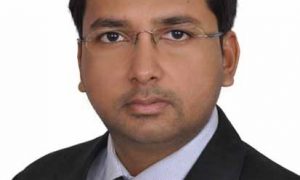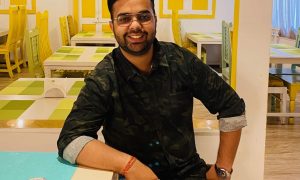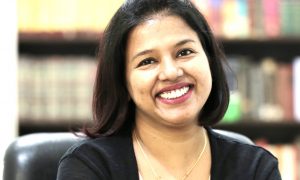This interview has been published by Namrata Singh and The SuperLawyer Team

Sachin, your professional journey is quite impressive, spanning the realms of pharmaceuticals, law, and intellectual property. What sparked your curiosity in Intellectual Property, eventually leading you to become a partner and patent Attorney at K&S Partners?
My first exposure to Intellectual Property is in my academic life when I was pursuing M.Tech. (Pharmaceutical technology) from NIPER, Mohali. We had a course curriculum that also includes a 6-month course on Intellectual Property (IP) conducted by the head of the IP cell of NIPER Mohali. There, I got to know about Intellectual Property rights and general patent laws across the world. My first-hand experience in patent drafting was from my research project on anti-cancer molecules. I myself conducted prior art patent searches and drafted two patent applications at that time in the institute, which were also granted by the Indian Patent Office later on during the examination of the applications. I think that was the time that sparked my curiosity towards Intellectual Property rights, particularly patents and the intersection of science and law.
Achieving All India Rank – 1 in the Patent Agent exam is a significant accomplishment. Can you share some thoughts on the perspective on patent law and the role it plays in innovation?
Indeed, clearing the patent agent exam that too with AIR-1 is a memorable achievement for me. I think patent law motivates innovators to create something new for the benefit of society at large. Patents drive innovation and create a significant impact on the ground. Innovators disclose their inventions in return for an exclusive monopoly for 20 years. After 20 years, the invention is open to the public for its use. This way, both are benefited, and the innovation cycle keeps on evolving.
Being recognized as a Rising Star and Notable Practitioner by Managing Intellectual Property is a significant achievement. How do you balance staying at the forefront of your field?
I thank all my colleagues at K&S Partners for guiding me and making me what I am today. I think the IP landscape in India is changing at a fast pace. All the stakeholders in IP – government/private are really contributing to the country’s evolving IP landscape. I try to keep abreast of the latest developments in Intellectual property, particularly patents and any policy updates in this area. Importantly, I also learned a lot of things related to the peculiarity of patent matters of my clients during prosecution before the Indian Patent Office. Overall, as usual for other law subjects, this field also requires regular upgradation of knowledge/understanding of patent laws.
Your research on the anti-cancer domain earned you the Best Poster Award from a Nobel laureate. Can you tell us a bit about the research and have you patented this anywhere?
The research was on an improved process for preparing some anti-cancer compounds. Normally, preparing said anti-cancer compounds at that time was very tedious and time-consuming with very little yield in previously known methods. We, as a part of the research team, developed certain new efficient processes and validated the same in labs. Finally, we presented a poster at a scientific conference in CDRI, Lucknow. Fortunately, my poster was selected for the best post award from a Nobel Laureate Dr. Grubbs who pioneered in olefin metathesis chemistry. We did file the patent application in India for said new processes and secured the grant from the Indian Patent Office.
In your 13 years of professional experience, what challenges have you encountered, and how have you innovatively addressed these challenges for the benefit of your clients?
As I practice in the pharmaceutical/chemical area, I have handled numerous contentious issues that arise during prosecution of patent applications in India. I have also dealt with several patent oppositions filed by Opponent by way of pre-grant or post-grant opposition. I always make sure to inform my clients timely and my recommendations for any case and seek their inputs. Sometimes, experimental data/additional information is required for defending patent applications and I accordingly try to strategize the case based on the facts/merits of each matter.
Beyond your professional life, what are your personal interests, and how do you ensure a balance between your demanding career and personal pursuits? Additionally, how do you stay updated on the latest developments?
I love travelling and like to explore new places. In any demanding career, it is also equally important to take out some time for your mental well being. I personally always try to balance work demands and personal goals and take breaks as and when required.
To stay updated with the latest development in IP, I strongly recommend cultivating a habit of reading. I personally mark the important articles/judgements in my area of interest and read in my available time.
Given your extensive experience in patent prosecution and enforcement, what advice would you offer to aspiring patent attorneys or those considering a career in intellectual property law?
IP is a lucrative field and I am noticing that a lot of law/science graduates are willing to pursue IP as a career option. For aspiring patent attorneys, I would strongly recommend having strong technical expertise in scientific research in the first place and at the same legal acumen to comply with the Indian Patents Act. It is important for them to have a basic understanding of the Indian Patents Act.
Case laws are really helpful to know beyond the legal language of Patents Act and to be able to provide practical advice in each patent case. Particularly for students of pharmaceutical/chemical background, I strongly suggest having a general understanding of Section 3 of the Patents Act since lot of objections from Indian Patent Office falls within this category and how they can deal with the same.
Government conducts patent agent exam every year and a thorough understanding of the Indian Patents Act and rules thereof is required to pass the exam to become eligible to practice as a patent agent before Indian Patent Office.
Get in touch with Sachin Bindal-
























